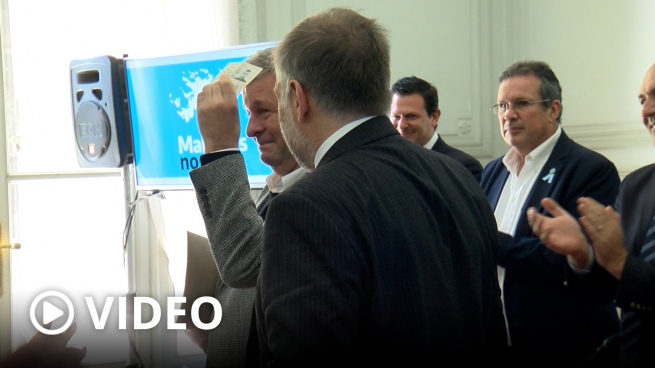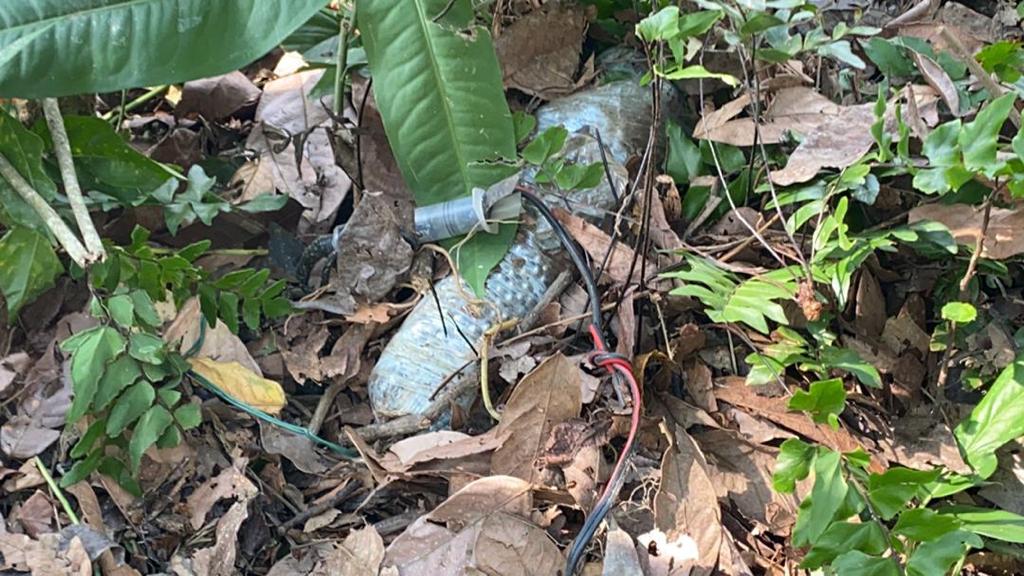In an emotional act, they gave Edgardo Esteban appropriate documents in the Falklands War
WATCH VIDEO
Forty years after the war, the director of the Malvinas Museum and ex-combatant Edgardo Esteban received this Thursday his personal documents stolen at the time of the surrender of the Argentine troops, in the framework of an emotional act in the Palacio San Martín, where he stood out the “persistence” to achieve this reparatory milestone and the hope that “it will serve as a precedent for similar cases.”
In front of war veterans, representatives of the Grandmothers of the Plaza de Mayo and their relatives, Esteban received his belongings with tears in his eyes from the hand of the Argentine ambassador to the United Kingdom, Javier Figueroa, after the British police handed them over to London .
The act was led by the Secretary of the Malvinas, Antarctica and South Atlantic of the Ministry of Foreign Affairs, Guillermo Carmona, who stressed that it is “an important precedent for other appropriate objects.”
The event was also attended by the Ministers of Culture, Tristán Bauer, and of Science, Technology and Innovation, Daniel Filmus, the lawyer Federico Cincotta and the journalist and historian Alicia Panero, who made brief reflections on the meaning of the delivery.
“It is not about recovering lost objects, here we are dealing with the recovery of objects that were illegally appropriated. It is a sensitive and particular aspect that has to do with the identity of people, such as Edgardo’s military ID,” he said. Carmona.
In that sense, the official wanted “this to be a metaphor for the recovery of other things,” alluding to the Malvinas Islands, “that part of the national territory appropriated by a foreign power.”
“Edgardo represents an example of persistence in the face of reluctance and the commitment to achieve high goals that seem unattainable but that reality shows – as in this case – that they can be achieved,” he stressed.
For his part, Esteban thanked this “collective rescue” of his belongings, and stressed that the Malvinas cause “is and will be until the last day of my life.”
“It was shocking to know that there was a story to recover. Since the news of my military ID with which I traveled to the trains or went to dance at nightclubs arrived, it was a part of my identity. Recovering this is not minor and it’s starting to put together a puzzle”, he affirmed and highlighted that it is also about 44 other stories recovered among those objects, which had been appropriated and which belong to other people.
“Along with this there are 44 stories that are here and we are going to work with the research team. Because if we don’t do what war loot piracy does, a business, because it hurts to go to the British museum and have to buy your photos” , he reflected.
In July 2020, Edgardo Esteban learned that several of his personal belongings, such as his soldier’s ID and a roll of photographs, had been auctioned on the eBay web trading platform in London as “war trophies” thanks to the notice that journalist Alicia Panero gave him.
The objects were stolen 40 years ago while he was a prisoner and embarked on the British ship SS Canberra in 1982. From that moment on, a series of actions were triggered that culminated in the delivery of the belongings, consolidating a precedent for similar cases.
Esteban’s belongings had been purchased by a private individual who later sold them to an anonymous collector.
The Argentine ambassador to the United Kingdom, Javier Figueroa, carried out several steps demanding their return, but only received refusals. At the suggestion of the lawyer Damián Loretti, on March 31, 2021 Edgardo filed a criminal complaint in London, through the lawyer Federico Cincotta.
The presentation was made to the London Metropolitan Police against illegal holders to try to recover their belongings.
Opportunely, Daniel Filmus and Guillermo Carmona accompanied this entire process.
On April 11, the anti-terrorist division of the British police delivered these stolen objects to the Argentine Embassy in London.
The Malvinas Museum investigation team will work to identify the owners of the photographs and to restore them.
The authorities also reported that until their protagonists are found and they are not expressly authorized by them or their relatives, they will not be made public.
During the act, Filmus highlighted the work of human rights and identity in front of referents of the Grandmothers and Mothers of Plaza de Mayo, such as Taty Almeida, and confirmed that the Argentine identity “has the absence of a territory” because it is not complete without the Falkland Islands.
“There is still a lot to fight for. It is Edgardo’s life and it gives us strength to continue fighting. We are not going to lower our arms until we have fully recovered our identity with our flag in the Malvinas Islands,” he stressed.
For his part, Minister Bauer was “very emotional” on this day “of justice and reparation” and said: “This recovery is truly important and moving. Let’s keep thinking about the great struggles and words. Fight against fear of colonialism and not stop until we obtain the full exercise of the sovereignty of the Malvinas”.
In his turn, Ambassador Javier Figueroa expressed that this day moves him personally because of his relationship with Edgardo Esteban: “The management and investigation allowed the conversion of something that was an inert war trophy in a showcase to a document that speaks of the history of identity,” he said.
For his part, Cincota spoke of the fourteen-month process that ended today and began with the complaint to the British police going through moments when it was thought “that we were not going to have any luck.”
“After perseverance and insistence, I am extremely happy to have obtained what I could call a dream. This case is a milestone and I hope it will serve as a precedent for similar cases,” he shared.
Finally, the historian Panero – who found the documents – maintained that the whole process was “very shocking”, but that she never doubted “that the most important thing was the recovery of identity”.











